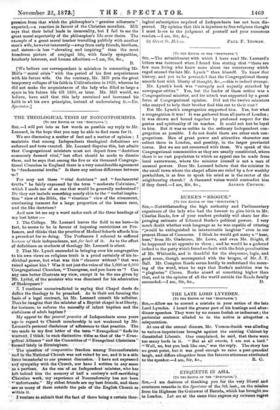THE THEOLOGICAL TESTS OF NONCONFORMISTS.
(TO THE EDITOR OF THE "SPECTATOR"]
SIR,—I will put into as few words as possible my reply to Mr. Leonard, in the hope that you may be able to find room for it.
We are discussing a matter of fact and a matter of opinion ; I maintain that among Independents theological definitions are enforced and tests exacted. Mr. Leonard disputes this, but admits that Congregational ministers must not depart from "doctrines ,commonly deemed vital," lest effort should be made to dismiss them, and he says that among the five or six thousand Congrega- tional Churches in England there is a very considerable agreement in "fundamental truths." Is there any serious difference between
For may not these " vital doctrines " and " fundamental %truths " be fairly expressed by the term " moderate Calvinism," which I made use of as one that would be generally understood ? Do they not include something nearly akin to the "verbal inspira- tion " view of the Bible, the " vicarious " view of the atonement, 'everlasting torment for a large proportion of the human race, and the like doctrines?
And now let me say a word under each of the three headings of tny last letter :- 1. The College. Mr. Leonard leaves the field to me here—in fact, he seems to be in favour of imposing restrictions on Pro- fessors, and thinks that the practice of Medical Schools affords him a precedent for so doing. The Professors I referred to suffered tecause of their independence, not for lack of it. As to the effect of definitions on students of theology Mr. Leonard is silent.
2. That Mr. Lynch succeeded in bringing over his congregation to his own views on religious truth is a proof certainly of his in- dividual power, but what was this " clamour without" that was raised against him ? Was it not just the voice of the 5,000 or 6,000 'Congregational Churches, " Transgress, and you leave us "? Can any case better illustrate my view, except it be the one given by Mr. Lyttel, of the minister who was dismissed for his admiration of Shakespeare?
3. I continue uncontradicted in saying that Chapel deeds do define the theology to be preached. As to their not forming the basis of a legal contract, let Mr. Leonard consult his solicitor. Does he imagine that the minister of a Baptist chapel is at liberty, for instance, to enforce the necessity of infant baptism and the sinfulness of adult baptism?
My appeal to the general practice of Independents some years ago in regard to Church membership is not weakened by Mr. Leonard's personal disclaimer of adherence to that practice. The use made in my first letter of the term " Evangelical " finds its warrant, I think, in such distinctive titles as that of the " Evan- gelical Alliance " and the Committee of " Evangelical Christians " -formed lately in Birmingham.
The question of comparative freedom among Nonconformists and in the National Church was not raised by me, and it is a side issue immaterial to our present discussion. I have not expressed any sympathy with the Church, nor have I written in any sense as a partisan. As the son of an Independent minister, who has left behind him the memory of half a century's self-sacrificing Christian work, my experience of Nonconformity has not been " unfortunate." My oldest friends are my best friends, and there are as many of them outside the pale of the English Church as within it.
I venture to submit that the fact of there being a certain theo-
logical subscription required of Independents has not been dis- proved. My opinion that this is injurious to free religious thought I must le we to the judgment of yourself and your numerous readers.—I am, Sir, &c.,


































 Previous page
Previous page